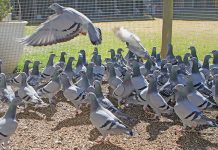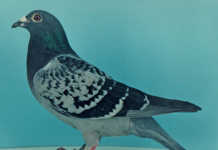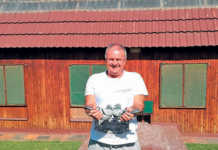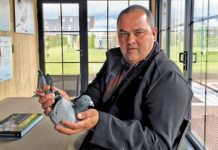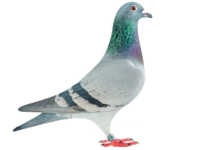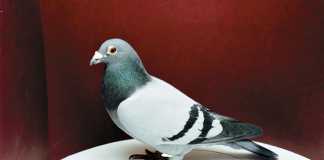How to buy from an auction
Unless you are a beneficiary in a top pigeon fancier’s will, the only way you will lay your hands on a prime stock pigeon is to buy it at the dispersal auction.
Unfortunately you will not be the only interested buyer, which means the purchase price could be beyond your budget. There are a number of racing pigeon auctions in South Africa every year, as well as overseas auctions where you can make a purchase via the internet.
Not all auctions are dispersal auctions and in the event of a partial auction one must expect the fancier to keep some prime-quality birds off the sale. There are also promotional auctions where a pigeon club organises quality pigeons from top fanciers to be auctioned for club funds.
These birds are often generously selected from champion fanciers who will want to protect their good names and character – that makes the purchase of these birds a safe buy in terms of obtaining quality.
What do you need? If you are a starter, you will not have the knowledge to select the best birds other than by the recommendation of the owner or a reliable agent.
If the auctioneer is a pigeon fancier he could give you some sound advice.
The question to ask is, what does a beginner need, other than acquiring a few good pigeons?
You need to make your acquisitions with the future in mind. A ll established fanciers of repute own a family of high-quality stock birds that are interrelated. While many champion lofts are founded on a first cross – that is the mating of two unrelated birds – it is still necessary to build upon the near kin from the original gene pool to preserve the quality. Whether the original pair was related to a first cross or not is not the main criterion – that they should be suitable for each other as a match pair is more important. Buying at the auction will be costly as you need to breed from at least five pairs. Four to six youngsters per pair will see you end up with 20 to 30 youngsters to start your season. Unless you are going to purchase a few more youngsters from a reputable breeding station, you will be forced to join a specialist club that has an entry limit of only 10 birds per week. Another option is to join a large organisation as a novice where you will pay a reduced entry fee and only participate for a few race events to put you through a learning curve. Study the sales catalogue well-compiled sales catalogue will provide enough references to enable you to learn which birds on the auction are the superstars. The pigeons used as foundation birds will be listed first. Either a male or a female stands out more prominently as the bird responsible for the golden thread of quality – but this masterpiece needed a mate or a few mates to be able to have reproduced high-quality youngsters.
The following criteria are important: Did the pigeons score at the top in strong competition? Are there a large number of individual pigeons that often scored at the top as opposed to a single score? From which race distances did the birds do the best in competition? If you want to become successful in sprint racing, do not buy from a fancier whose birds are predominantly successful on the long distances, and vice versa.
Many birds need two to three years to mature in the race team before they peak in competition. Try to purchase birds that mature in the same year of their birth – this will save time and money. If you live in a hawk-infested area do not buy birds with white/red or gay pied colours – the hawks prey on them.
Making a choice of the foundation pair are not too old and the owner guarantees fertility, buy them. If need be, form a syndicate. Buy a few top offspring from the foundation pair. Then look at the youngsters on auction and get a few from other prominent breeders of the sale, and hey presto, you can continue the family in much the same way as the seller.
Test and trial
You now have to learn the skill of matching pairs and testing the offspring. This takes time, patience and a few rand – spend it and enjoy it. – Thomas Smit For more information contact Thomas Smit on (011) 680 4778, e-mail [email protected]. |fw


